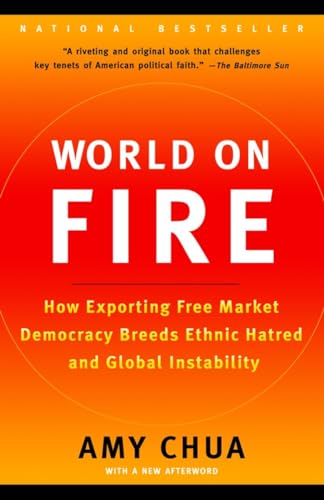World on Fire
How Exporting Free Market Democracy Breeds Ethnic Hatred and Global Instability
Amy Chua
BOOK REVIEW

The world spins on axes far deeper than we perceive, and no one grasps this truth better than Amy Chua in her provocative World on Fire: How Exporting Free Market Democracy Breeds Ethnic Hatred and Global Instability. This work doesn't just present a theory; it detonates narratives and challenges the very foundation of what we consider to be progress in our modern society. Chua's exploration is a razor-sharp incitement to rethink our blind faith in the miraculous powers of democracy and capitalism.
Chua, a Yale Law School professor and daughter of Chinese immigrants, taps into her own experiences and profound understanding of both American capitalism and global dynamics to craft a narrative that is equal parts chilling and enlightening. The book emerges from a historical context rife with the turbulent aftermath of the Cold War and geopolitical machinations that have shaped nation-states and their identities. Since the inception of global democracy promotion in the late 20th century, it becomes painfully clear that the push for free-market policies has not been the utopian liberator we've been sold. Instead, it has seeded deep-rooted ethnic tensions and instability.
As you dive deeper into Chua's narrative, the pages burst forth with anecdotal case studies that illustrate her thesis: the insistence on exporting democracy to diverse, culturally distinct nations often ignites the very hatreds it seeks to extinguish. Countries like Yugoslavia, Rwanda, and Iraq emerge as cautionary tales, each typifying how newly minted democracies can devolve into chaos when imperialistic ideals clash with local fabrics of identity and resentment. The author lays bare her argument with brutal honesty, urging readers to grapple with the unsettling reality that our well-intentioned policies might be lighting the fuse on global unrest.
Critics of World on Fire argue that Chua's perspective skews dangerously toward cynicism, accusing her of painting a world too simplistic for the complexities of contemporary geopolitics. They posit that her observations risk undermining genuine reform processes by framing them solely in the context of colonial guilt and failure. Sometimes, criticism hinges on the notion that she confuses correlation with causation-after all, can we truly blame democracy promotion for centuries-old ethnic rivalries? Yet, this is precisely where the emotional gravitas of her writing shines. Chua's unapologetic approach forces you to confront uncomfortable questions about your own beliefs regarding democracy.
The emotional potency of World on Fire cannot be overstated. Chua's words resonate with an urgency that transcends mere academia; they echo like alarm bells in a society blissfully unaware of its own complicity in global turmoil. When she reveals that "free-market capitalism creates an elite class that benefits disproportionately, while diminishing the prospects of the broader population," the realization hits hard. How many times have we cheered for democracy's advancements without recognizing the collateral damage? The book turns the mirror onto our faces, prompting a reckoning that is both disorienting and necessary.
Chua's impact stretches far beyond the pages of her book, influencing thinkers and policymakers, sparking debates that endure in today's political and social conversations. Her work has contributed to a broader discourse on the fragility of democratic institutions in ethnically diverse societies. Readers are left in contemplation, wrestling with the profound implications of Chua's insights: how do we navigate the delicate balance between championing democracy and respecting the unique identities of nations? These questions demand introspection and activism, and they invigorate discussions that are critical for us to engage with as we navigate an increasingly polarized world.
The voices of readers reflect a spectrum of reactions, from ecstatic praise for Chua's insightful analysis to vehement disagreement with her conclusions. Some laud her as the "intellectual hero" who forces us to rethink the status quo, while others dismiss her work as too deterministic-an oversimplified view that misrepresents the complexities of modern governance. Nonetheless, it is impossible to ignore the power of her assertions, as they hold a mirror to our modern political landscape, igniting a sense of urgency that compels us to act and to learn from history's missteps.
In World on Fire, Amy Chua gifts us an intellectually audacious toolkit for dismantling complacency, urging us to reclaim agency in a world seemingly ablaze with discord. So, as you walk through your day, ponder this: what responsibilities do we hold towards identity and democracy, both in our backyard and abroad? Ignoring Chua's narrative means neglecting a chance for deeper understanding-a wicked choice in a world already too chaotic. 🌍🔥
📖 World on Fire: How Exporting Free Market Democracy Breeds Ethnic Hatred and Global Instability
✍ by Amy Chua
🧾 368 pages
2004
#world #fire #exporting #free #market #democracy #breeds #ethnic #hatred #global #instability #chua #AmyChua